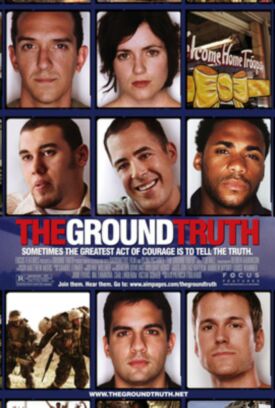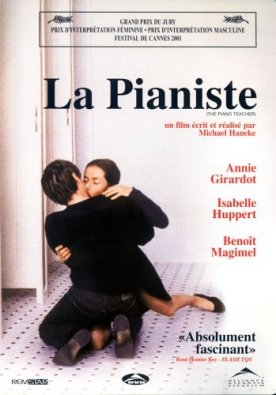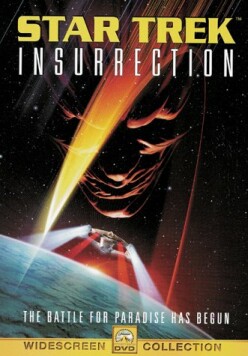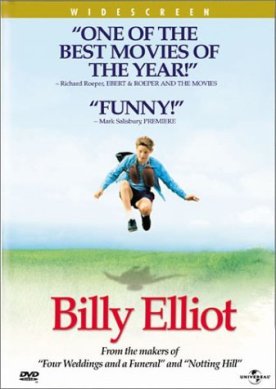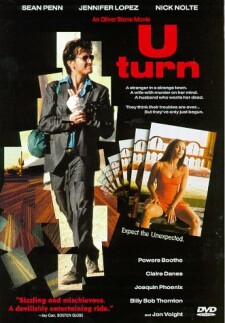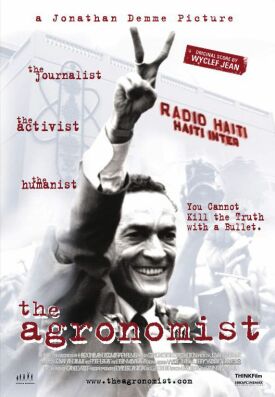Ground Truth, The
The title of Patricia Foulkrod’s The Ground Truth is accurate in the sense that such truth as there is in the movie occurs at the ground level. To underscore the fact, she begins with shots of corpses — ex-human beings leveled with the ground by war. It’s a forewarning that the rest of the film will be about war at its most visceral and emotional level, as described in numerous talking-head interviews with veterans of the conflicts in Iraq and Afghanistan. What all her veterans have in common is that they are now against the war. Some of them are maimed or have experienced terrible wounds; some claim to have committed or witnessed atrocities. All want to use the power of the movies to convey strong feelings to make an emotional case against the war — or wars.
Every interview boils down to a restatement of the basic thesis: war is hell. Now where have we heard that before? Yet we look in vain for any particular application of the emotional case against war to Iraq or Afghanistan. All wars are horrible at ground level; all wars produce death and terrible wounds. What makes this one special? We’re not told. The film’s message is really pacifist, though it chooses not to come right out and say so. This makes for a certain amount of absurdity. At times Ms Foulkrod’s subjects speak as if the nastiness of war came as a big surprise to them. The recruiter only told him of the opportunities he would have in the army, one complains. “There’s no Surgeon General’s warning. They don’t tell you the consequences.” You mean war can be hazardous to your health? Who knew?
Such naïveté is not in nature, but it suits the film’s purposes to pretend that it is — that, indeed, none of the poor lambs led off to slaughter by mendacious military salesmen had any idea of what they were getting into. After the corpses, the camera moves on to show a Marine recruiter, making a sale, and then a Marine swearing-in parade. Gee, that’s something no one has thought of before, the contrast between the splendid uniforms and brass bands and the sight of dead people on the ground. What poor dupes those Marines must be not to know what the “reality” behind their parade amounts to! Once they’re enlightened, of course, they’re likely to cast about for explanations as to why they did what they did that don’t involve their own choices. You may not want to kill, says one, but because of “peer pressure, group thinking, you’re going to do it.” Another says: “You’re just trapped in the bubble and that’s how it is.”
That kind of childish helplessness might be supposed to contrast oddly with the attitude of a Marine who tells us that what attracted him to the Corps is the fact that “They’re mean, they’re tough, they’ve got cool uniforms and chicks dig ‘em.” When a recruiter told him of his career options, he says he cut him off, saying: “I want to be a grunt. I want to blow s*** up.” But there seems to be no contradiction here, no hint that the reformed sinner cannot also be the deluded innocent. Still, I infer that such an admission of eagerness to join the battle is meant to be scandalous. The only thing more shocking than the horror of war is the thought that some people might actually enjoy it. Once again, this isn’t exactly news to most people. But treating it as such is Ms Foulkrod’s way of keeping the film’s sense of outrage on the boil.
But the more her vets complain about the unprecedented awfulness of their experiences, the more she implies that those who shared those experiences and who don’t complain or oppose the war but quietly go on doing their duty must be either vicious or stupid. As no one is allowed to make a case for the war, we are meant to suppose that there isn’t one. No one, apparently, has any idea that the violence might have some purpose — or even that some people might think it has a purpose — apart from sadistic pleasure in it for its own sake. One guy says of his friends who were killed, “I told myself that they died for a reason, but I couldn’t find that reason; I couldn’t justify it to myself.” Fair enough. But why should we suppose that no one else can find a reason either? How hard did Ms Foulkrod look before she gave up on finding anyone?
In her “Director’s Statement,” she tells us that “I produced and directed The Ground Truth because I felt it was time to stop hiding behind the politics.” Hiding? But the politics is what this war, and any war, is about. Politics explains why we went to war and is the only measure of success in war. Making a movie about war and leaving the politics out is like making a movie about football and leaving the rules and the scoring out. It’s a lot easier to make your case against it if you can pretend that the game consists of nothing but guys running around and hitting each other at random. And, of course, it’s disingenuous to pretend that she herself has no politics. What she chooses to include and what she chooses to leave out of her film speak eloquently of her own political purposes. But like most of today’s political documentarians, she prefers to pretend that she hasn’t got any, and that “the ground truth” is the only truth there is. That’s what used to be called propaganda but now, I’m afraid, has become the norm.
Discover more from James Bowman
Subscribe to get the latest posts to your email.

